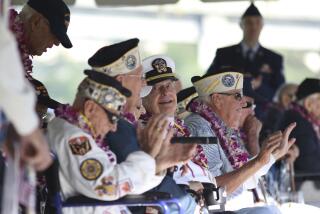Japanese leader Shinzo Abe to visit Pearl Harbor with Obama
Japanese Prime Minister Shinzo Abe announced plans Monday to visit Pearl Harbor, becoming the first sitting Japanese leader to visit the Hawaiian naval base since the 1941 attack that killed more than 2,400 people and led to America’s entry into World War II.
Abe’s decision to accompany President Obama to the site later this month is intended to reciprocate Obama’s trip in May to Hiroshima in Japan, where the U.S. president commemorated victims of the U.S. nuclear bomb dropped in the closing weeks of the war that left 140,000 people dead.
Like Obama’s historic trip, Abe’s will require delicate diplomatic scripting. Obama did not apologize for the nuclear bomb — he spoke mainly about the need to eliminate nuclear weapons. Abe is likewise not expected to apologize for the Pearl Harbor attack.
“This will be a visit to console the souls of the victims,” Abe told reporters in Tokyo in announcing the trip, which is to take place Dec. 26 and 27. “I would like to show to the world the resolve that horrors of war should never be repeated.”
In Honolulu, where preparations were underway for ceremonies to mark the 75th anniversary of the attack on Wednesday, a survivor said he believed Abe would be warmly received.
“It has been a long time we have been living with the Japanese as partners in this world,” said Ray Emory, 95, who was aboard the USS Honolulu when it was attacked at Pearl Harbor and who remains active campaigning for the remains of the victims to be identified.
He said he has a Japanese son-in-law. “I have nothing against them in any way, shape or form.”
Despite the close relationship between the U.S. and Japan that has evolved in recent decades, the healing process over World War II has been slow. It was not until 2010 that a U.S. ambassador, John Roos, attended the annual memorial ceremony at Hiroshima for the victims of the Aug. 6, 1945, bombing.
In Japan, pressure from nationalists has made it difficult for Japanese leaders to express unequivocal apologies over the military’s conduct before and during World War II.
“The whole region is embroiled in this politicization of history and national identity and that has taken on an extraordinary role in shaping diplomatic overtures,” said Shihoko Goto, an expert at the Woodrow Wilson Center’s Asia Program in Washington. “This is a huge step symbolically for Shinzo Abe.”
Abe, whose own grandfather was accused of war crimes but never prosecuted, has been trying hard to cement his country’s ties with the United States in recent weeks. He was the first foreign head of state to meet last month with President-elect Donald Trump.
The White House welcomed Abe’s trip to Obama’s home state of Hawaii, and confirmed that Obama will accompany him to the battleship Arizona memorial at the harbor.
“The two leaders’ visit will showcase the power of reconciliation that has turned former adversaries into the closest of allies, united by common interests and shared values,” Josh Earnest, the White House press secretary, said in a statement.
“The meeting will be an opportunity for the two leaders to review our joint efforts over the past four years to strengthen the U.S.-Japan alliance, including our close cooperation on a number of security, economic, and global challenges,” he said.
Japan attacked the U.S. naval base at Pearl Harbor on the morning of Dec. 7, 1941, aiming to diminish Washington’s Pacific Fleet. About 200 Japanese aircraft bombed the site, destroying 164 aircraft and several naval vessels, including the Arizona, a 600-foot-long battleship whose wreckage still lies at the bottom of the harbor.
The following day, President Franklin D. Roosevelt addressed Congress to ask for a declaration of war; he described the day as “a date which will live in infamy.”
About three years later, in August 1945, the U.S. dropped atomic bombs on Hiroshima and Nagasaki, and Japan surrendered. Since the end of the war, Japan and the U.S. have become close allies — trade between the two countries totaled an estimated $290 billion in 2012, according to the United States trade representative. More than 50,000 U.S. troops are stationed in Japan.
Abe’s wife, Akie Abe, visited the Arizona memorial in August. She posted to Facebook that she had offered flowers and prayers.
In August 2015, on the 70th anniversary of Japan’s surrender, Abe expressed “remorse” for his country’s actions during the war, but did not formally apologize. “I express my feelings of profound grief and my eternal, sincere condolences,” Abe said.
Goto said she expects a similar statement from the Japanese leader during his Hawaiian visit.
“There is no word about apology, but one is supposed to read between the lines,” she said.
jonathan.kaiman@latimes.com
Follow @JRKaiman on Twitter
ALSO
Another populist victory: Italian prime minister says he’s resigning after referendum defeat
How the Trump presidency could impact South American currency markets
Trump’s call with the Taiwanese president was his latest break from diplomatic norms
UPDATES:
4:55 p.m.: The story was updated throughout with reaction and analysis.
7:40 a.m.: This story was updated throughout with staff reporting.
This story was originally published at 5:45 a.m.
More to Read
Start your day right
Sign up for Essential California for news, features and recommendations from the L.A. Times and beyond in your inbox six days a week.
You may occasionally receive promotional content from the Los Angeles Times.






